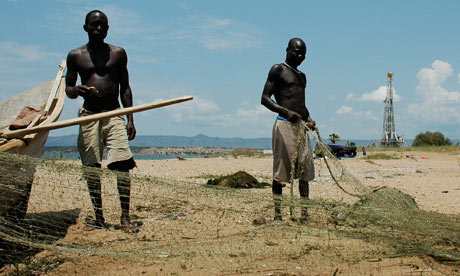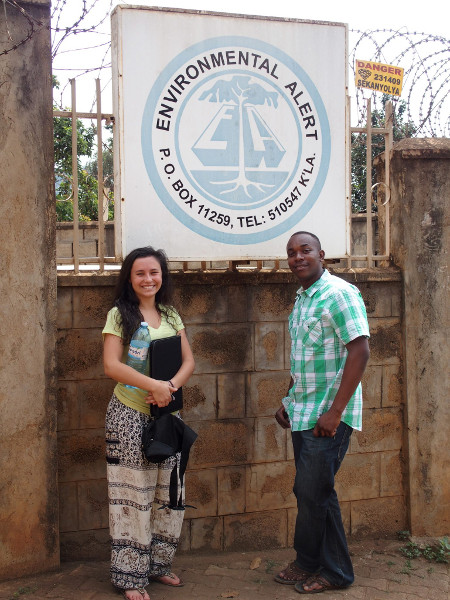by Lauren Vallez and John Abraham, "Climate Consensus -- The 97%," The Guardian, March 17, 2014

Fishermen near an oil rig on the edge of Lake Albert in western Uganda. Photograph: Xan Rice.
As I have written before, I have a particular interest in smart energy sources for the developing world. Issues of climate change and energy supply meet as countries try to provide basic services for their populace. Some contrarian climate scientists have claimed that developing clean energy sources is unwise for these countries – insisting incorrectly that dirty energy is the future. Most of us are smarter than that. Most of us realize that deciding the best pathway forward requires balancing the costs of inaction with the costs of action. Let's not delude ourselves into thinking that countries are not already feeling the impact of climate change.
Part of my work involves helping countries chart wise energy pathways. My students also travel to developing countries and part of their work involves articulating the challenges and opportunities faced around the globe. This article is supplied by Ms. Lauren Vallez, a freshman student of engineering at the University of St. Thomas. This January, she was inUganda interviewing experts on the impacts and adaption strategies faced by that country. Here is what she found.
 Spending time with friends in Uganda (courtesy of L. Vallez).
Spending time with friends in Uganda (courtesy of L. Vallez).
"This January, I found myself sitting across from Senior Human Resource Officer in the Department of Administration, Office of the President of Uganda. I wanted to know whether they were observing changes to their climate, what those changes were, and if plans for adaptation had been developed. Mr. Benon Twineobusingye, Senior Human Resource Manager in the Office of the President told me that they were already facing increased drought and changes to the hydrological cycle.
Much of the Ugandan economy is based on agriculture, a practice infused in their culture. Normally regular wet and dry periods have become more varied. He stated that they are, '…seeing drought. Serious drought that has not happened before. This drought has caused famine in parts of the country. In other parts, there has been too much rain.' He also told me, 'It has been very hot these days. Over the years it has gotten hotter with more unpredictable weather.'
But, unlike many countries which are inactive, Uganda has plans. From the top levels of government, they have enacted policies which encourage reforestation. They also are taking steps to preserve wetlands. Will these steps stop climate change? By no means. But they will help insulate Uganda and its neighbors from the impacts.
His anecdotal perceptions matched with what scientists expect. Uganda, and many other countries in Africa are at or near the equator. Atmospheric circulation patterns provide regular rainy-dry seasons but the water cycle is being modified. This modification may be occurring because of large scale circulation changes, perhaps it is associated with increases in evaporation and water-holding capacity of the air. Regardless of the cause, people in countries like Uganda live close to the ground, acutely aware of changes to seasonal weather. They have cultivated an agriculture based on traditions that are now being challenged.
 Tea harvesting in Uganda, a country dependent on agricultural productivity (courtesy of L. Vallez).
Tea harvesting in Uganda, a country dependent on agricultural productivity (courtesy of L. Vallez).
I also spoke to Dr. Walaga Charles (Executive Director of Environmental Alert) who works on sustainability in Uganda. He concurred with Benon's assessment by telling me that there have been more unpredictable rainy seasons. They've observed shortened rainy seasons with crop failures. Although he believes rainfall will in general increase with climate change, the regularity will also change. They expect more flooding and saturated ground. I even observed such flooding during unexpected rains this January.
 Flooding in the streets of the capital Kampala after a brief but unexpected rain (courtesy of L. Vallez)
Flooding in the streets of the capital Kampala after a brief but unexpected rain (courtesy of L. Vallez)
But Dr. Walaga also told me that increases in temperature are increasing animal diseases and pests. For example, coffee rust is a leaf disease that is now being monitored. It used to be common in warm areas of the country but now is being found in new regions. The same is being observed with malaria.
He told me that Uganda has developed a climate change policy and an implementation plan. The government has established a climate change unit and is working to upgrade that unit into a department. International organizations such as the United Nations and the Global Environment Facility are providing funds to aid adaptation.
He also told me that Ugandan universities are performing research on climate change and are incorporating climate change into the curriculum. In particular, agricultural schools are developing climate change centers."
A master's degree student, Mr. Denis Bazalirwa, agrees. He told me,
'I agree there are significant changes in my country's climate. When I journeyed back there in December 2013, I noticed a change in both daytime and evening temperatures. Rarely did I observe people sleeping with fans and air conditioners but the rise in particular of night time temperatures has forced people to control the unbearable heat. Also, Uganda has two main weather seasons each year. Their timing, however, has changed and it is harder to tell when the current season will end.'
These comments show that on the ground, climate change is impacting peoples' lives, now. Not at some time in the future."
 Ms. Vallez and Mr. Bazalirwa at Environment Alert, Uganda.
Ms. Vallez and Mr. Bazalirwa at Environment Alert, Uganda.
As you can see, Ms. Vallez's essay has articulated steps being taken in this quiet country in East Africa. We can see that much of their efforts are focused on adaption rather than mitigation. Of course that makes sense. While everyone needs to work harder to reduce emissions and limit future climate change, from a practical standpoint, it makes little sense for Uganda to act alone in the face of inaction from others.
We also see the fallacy of arguments that suggest developing clean energy and using energy more wisely would hurt the poor and developing regions of the globe. These countries are being affected now, with tremendous economic and societal impacts now. Had we had a bit more forethought years ago, had we worked harder to make each gallon of gasoline do more, we would have ended up saving money for ourselves, and we would have made things easier for countries that are being affected by climate change today, like Uganda.







No comments:
Post a Comment